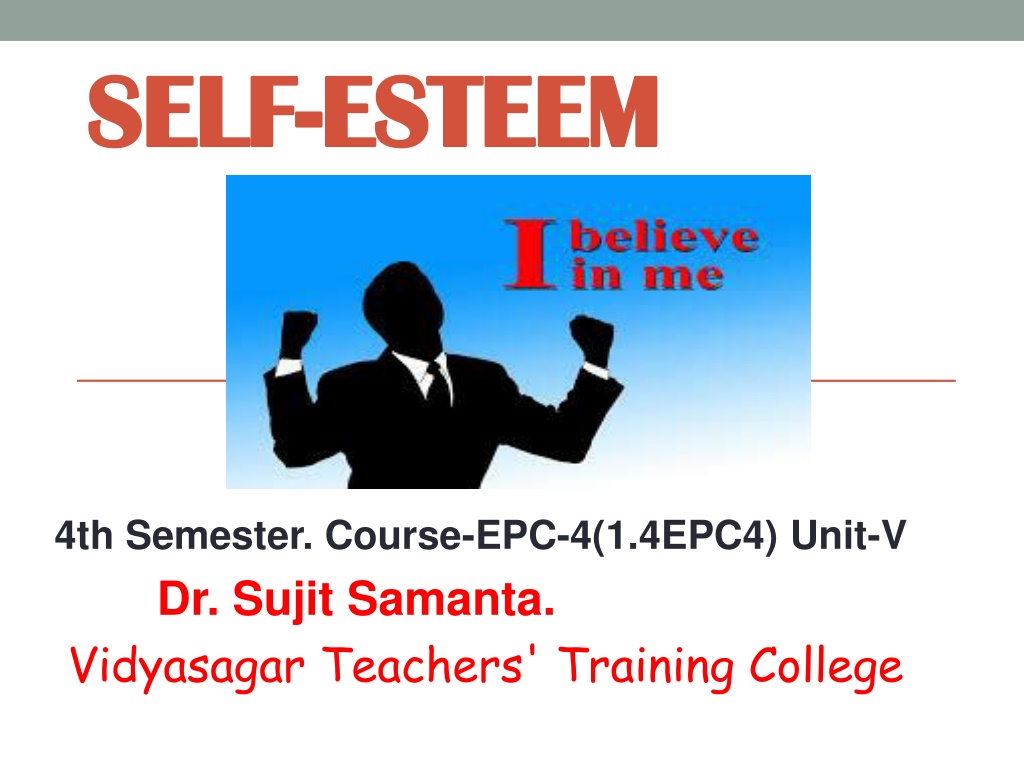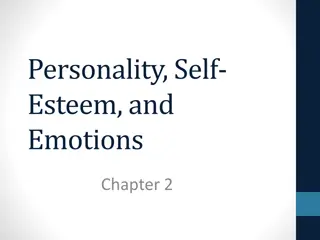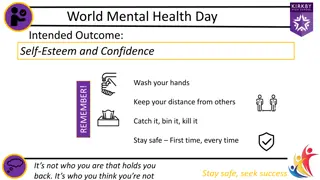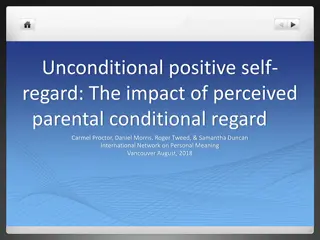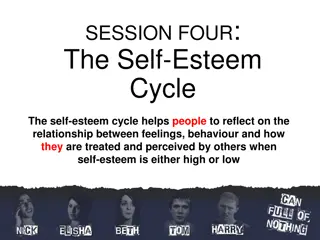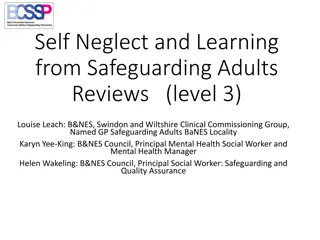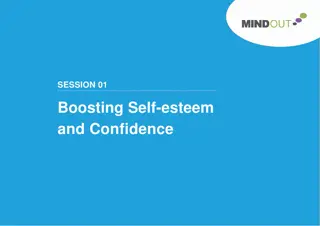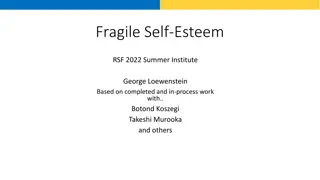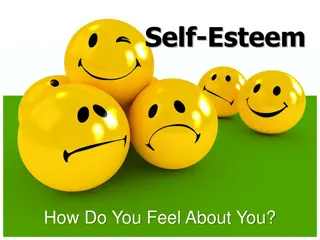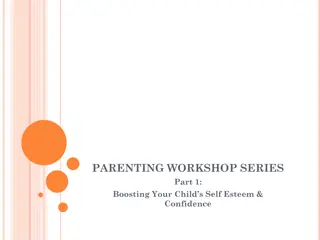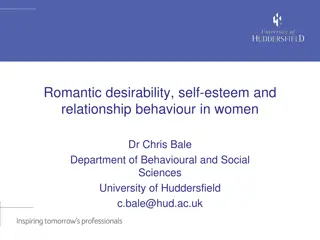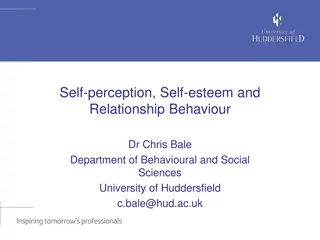Understanding Self-Esteem: Meaning, Importance, and Types
Self-esteem is how we perceive our worth and value. High self-esteem leads to confidence and positivity, while low self-esteem can result in self-doubt and negative emotions. Self-esteem impacts mental health, behavior, decisions, relationships, and overall success in life. Recognizing and nurturing self-esteem is crucial for personal well-being and growth.
Download Presentation

Please find below an Image/Link to download the presentation.
The content on the website is provided AS IS for your information and personal use only. It may not be sold, licensed, or shared on other websites without obtaining consent from the author. Download presentation by click this link. If you encounter any issues during the download, it is possible that the publisher has removed the file from their server.
E N D
Presentation Transcript
SELF SELF- -ESTEEM ESTEEM 4th Semester. Course-EPC-4(1.4EPC4) Unit-V Dr. Sujit Samanta. Vidyasagar Teachers' Training College
MEANING AND CONCEPT OF SELF- ESTEEM Self-Esteem refers to the way we see and think about ourselves.
Cont. Self-esteem refers to a person s overall sense of his or her value or worth. It can be considered a sort of measure of how much a person values, approves of, appreciates, prizes, or likes him or herself (Adler & Stewart, 2004) According to self-esteem expert Morris Rosenberg, self-esteem is quite simply one s attitude toward oneself (1965). He described it as a favorable or unfavorable attitude toward the self .
WHY SELF-ESTEEM IMPORTANCE ? Self-Esteem is important because it can affect: Your mental health. How you behave. Your decision . Your friendships. Your success. Your life.
TYPES OF SELF-ESTEEM There are mainly two types of Self-Esteem, they are as follow: High Self-Esteem: Low Self-Esteem:
HIGH SELF-ESTEEM A person who has high Self-Esteem feels good about themselves and feel confident. I think I can attitude
PEOPLE WHO HIGH ESLF-ESTEEM _ Feel Happy. Believe in themselves. Are ok with themselves as a person. Look forward to a good future. Are energetic and hopeful. Are confident. Like joining in with others. Are happy with each success. Look for ways to success. Don`t worry about how others will judge them.
LOW SELF-ESTEEM A person who has low self-Esteem feels bad about themselves and no confidence. I can`t do it attitude
People with low Self-Esteem Feel unhappy and miserable. Feel that they are not as good as others. Have no confidence in themselves. Feel tired most of the time. Do not want do anything actively. Have no respect for themselves. Distorted emotion and feelings. Difficulty in trusting people. Fear of trying new things. Panic attacks. Give up on dreams. Self-defeating behaviour. Negative critical about themselves. Friends do not want to hang-out anymore.
KEYS TO INCREASING SELF- ESTEEM. There are number of ways in which you can improve your self-Esteem: 1. Identify and Challenge your Negative Beliefs. 2. Identify the Positive About Yourself. 3. Build Positive Relationship and Avoid Negative Ones. 4. Give Yourself a Break. 5. Become More Assertive and Learn to Say No . 6. Improve Your Physical Health. 7. Take on Challenges.
When you Identify that your Self- Esteem is low, what can you do? Strive to increase your self-esteem. Listen to the positive and ignore the negatives. Celebrate your successes. Forgive yourself for your mistakes. Stop putting yourself down. Do not compare yourself with others. Because you are the unique individual, no one else is like you in the whole world. You are special! List your accomplishments. Accept compliments and give compliments.
STRATEGIES FOR POSITIVE BEHAVIOR The Six Pillars of Self-Esteem is a psychology book written by Dr. NATHAIEL BRANDEN. Dr. Branden is known as the father of the Self-Esteem movement. The book describes the key elements that incise Self-Esteem of an individual. The Six Pillars are: 1. The Practice of Living Consciously. 2. The Practice of Living Acceptance. 3. The Practice of Self-Responsibility. 4. The Practice of Self-Assertiveness. 5. The Practice of Living Purposefully. 6. The Practice of Personal Integrity.
REFFERENCES 1. ^ Jump up to:a b cSmith, E. R.; Mackie, D. M. (2007). Social Psychology (Third ed.). Hove: Psychology Press. ISBN 978-1- 84169-408-5. 2. ^ Marsh, H.W. (1990). "Causal ordering of academic self-concept and academic achievement: A multiwave, Hewitt, John P. (2009). Oxford Handbook of Positive Psychology. Oxford University Press. pp. 217 224. ISBN 978-0-19-518724-3. 3. longitudinal path analysis". Journal of Educational Psychology. 82 (4): 646 656. doi:10.1037/0022-0663.82.4.646. 4. ^ Jump up to:a b cUrbina Robalino, Gisella del Rocio; Eugenio Piloso, Mery Aracely (2015). Efectos de la violencia intrafamiliar en el autoestima de los estudiantes de octavo y noveno a o de la Escuela de educaci n b sica 11 de Diciembre (bachelor thesis) (in Spanish). Advised by S. Yagual. Ecuador: Universidad Estatal Pen nsula de Santa Elena. 5. ^ Jump up to:a b c d e f g h i j kBaumeister, R. F.; Campbell, J. D.; Krueger, J. I.; Vohs, K. D. (2003). "Does High Self-Esteem Cause Better Performance, Interpersonal Success, Happiness, or Healthier Lifestyles?". Psychological Science in the Public Interest. 4 (1): 1 44.
FURTHET READING: Branden, N. (1969). The Psychology of Self-Esteem. New York: Bantam.
